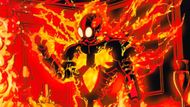Batman: The Animated Series (BTAS) is often hailed as one of the greatest adaptations of the Dark Knight's mythos. It introduced fans to numerous iconic characters, yet one notable absence was Firefly, the pyromaniac villain.
This absence raises an intriguing question: why was Firefly excluded from the classic animated series? To understand this, keep reading this article.
BTAS brought to life many of Batman's most infamous foes, including the Joker, Harley Quinn, and Two-Face. Each character was carefully crafted to resonate with audiences while staying true to their comic book origins.
In the comics, Firefly, originally created by writer France Herron and artist Dick Sprang in Detective Comics #184 (1952), was depicted as a villain obsessed with fire. His obsession often led him to commit arson and elaborate heists, providing a unique challenge for Batman.
Why did DC's Firefly not appear in the classic TV adaptation

One of the most significant reasons Firefly did not appear in BTAS was the stringent censorship guidelines enforced during its production. The series aimed to adapt Batman's darker themes, but certain content was deemed too extreme for a children's show.
Despite these restrictions, the creators of BTAS found creative ways to work around censorship. For instance, Mr. Freeze’s tragic backstory was developed to add depth and emotional weight to the character while keeping the violence and fire-related themes minimal.
Two years after BTAS ended, The New Batman Adventures (TNBA) premiered on Kids' WB. Unlike Fox Kids, the censors for Kids' WB were more lenient, allowing for darker storytelling and characters previously excluded from BTAS.
Though Firefly garnered critical acclaim, it faced a swift demise primarily due to low ratings. Fox's unrealistic expectations, combined with its poor marketing strategy—which failed to capture the show's adventurous spirit—set the series up for failure. Adding to its struggles was the notorious Friday night death slot, which didn't help its chances of survival.
The cancellation of Firefly was a heartbreaking moment for its fans. Fox aired the series' episodes completely out of order, a baffling decision for a show with only 14 episodes. Instead of starting with the essential pilot episode, titled Serenity, Fox launched the series with the second episode, The Train Job.
To add insult to injury, the final episode produced, Objects in Space, was aired before the pilot. This disjointed scheduling led to confusion among viewers, and three episodes never even made it to the original Fox run. They were only broadcast in the UK the following summer. While the Science Channel eventually aired all 14 episodes in the correct order, it was nearly a decade too late.
The complications of reviving Firefly

The potential revival of Firefly faces numerous complications, particularly concerning Joss Whedon, the creator of the series. Following a 2022 article detailing allegations from cast and crew members associated with his other works, Whedon has kept a lower profile.
Although some cast members, like Nathan Fillion, expressed willingness to work with Whedon again, many fans struggle with the implications of his controversies.
Despite this, some cast members hold different views on a revival. Fillion has suggested that the show achieved closure, while Alan Tudyk has voiced a desire for a reboot, albeit with a different twist.
Summer Glau expressed ambivalence about returning, noting that the magic of Firefly might be tied to its status as a beloved underdog story.
The story of Firefly is one of tragedy and triumph, a testament to the power of fan dedication and the complexities of creative ownership.
While the chances of a revival remain bleak, the legacy of Firefly continues to inspire its devoted fanbase.
